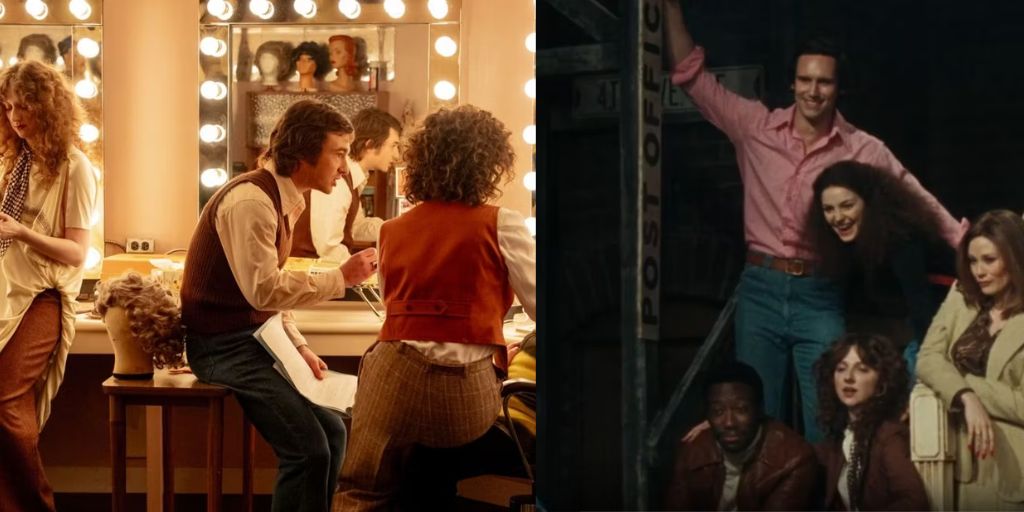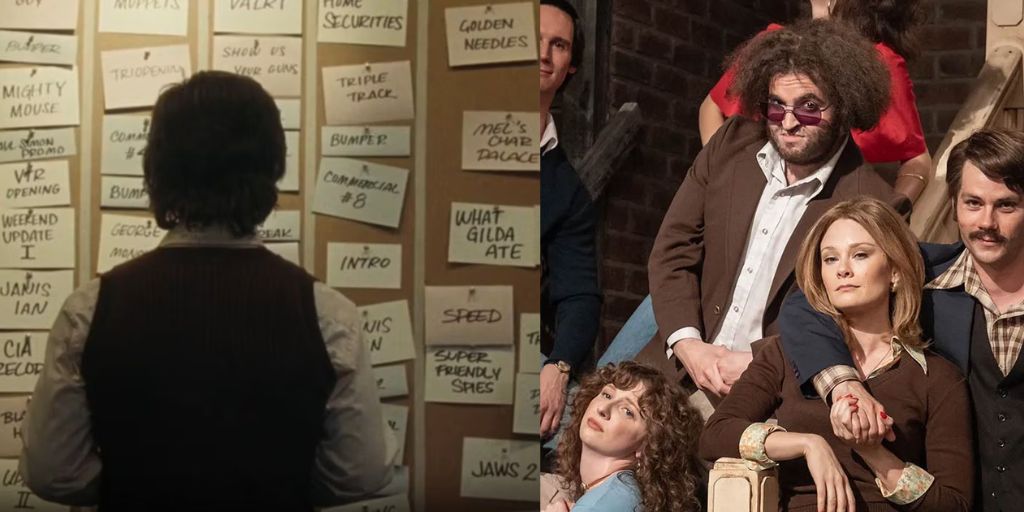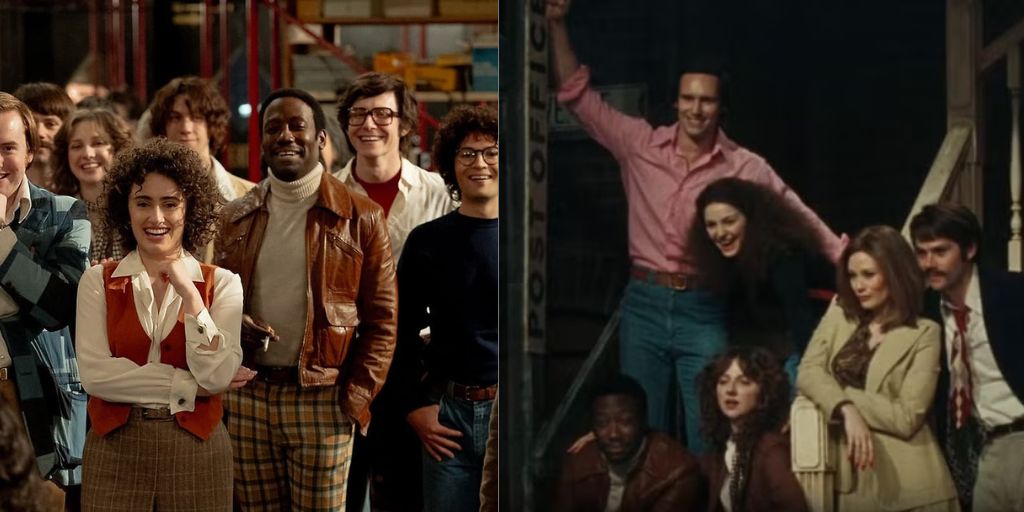Saturday Night gives an insightful look into the intense, high-energy atmosphere of Saturday Night Live (SNL), showing how its quick humor, unpredictable cast, and behind-the-scenes drama have led to over fifty years of groundbreaking television. The movie, directed by Jason Reitman, opens with one of SNL founder Lorne Michaels’ famous quotes: “The show doesn’t go on because it’s ready; it goes on because it’s 11:30.”
These words capture the essence of SNL, a show that combines rapid production with a comedic edge, aiming to entertain viewers each week no matter the challenges or risks involved. In this time frame, the team crafts episodes that can leave a lasting impression on pop culture or, at times, reflect the fast-paced demands of weekly broadcast television.
Critics who occasionally argue that SNL isn’t as relevant or funny as it once was might not fully appreciate that SNL has always been a mix of remarkable highlights and challenging moments.
With Saturday Night, Reitman, who co-wrote the script alongside Gil Kenan, known for Ghostbusters, set out to capture not only the story behind the show’s first live episode but also the unfiltered energy of bringing the show to life.
Rather than delivering precise impressions of comedy legends or creating a strictly factual retelling of the events leading up to SNL’s debut episode, Reitman instead focuses on the chaotic, rushed, and often humorous spirit behind producing a show that must go on air, ready or not, at 11:30 P.M. This intense preparation can feel less like organized rehearsal and more like organized chaos.
Through this lens, Saturday Night seeks to celebrate SNL’s unique work environment and the commitment of the people behind it, which has made the show a cultural phenomenon for nearly half a century.
The story centers around Gabriel LaBelle, known for The Fabelmans, as he takes on the role of a young Lorne Michaels. Michaels in this portrayal is a driven, young comedy producer who must prove to NBC that his concept for a live, variety-style comedy show—complete with musical guests, short films, and even Muppets—is a strong one worth supporting.

With just 90 minutes left before showtime, the odds seem stacked against the team. Network executives are demanding quick results and have their eyes on Michaels. Meanwhile, critical parts of the production are still missing: John Belushi (played by Matt Wood) hasn’t signed his contract, essential lighting crew members haven’t shown up, bricks are being laid in the studio as time ticks away, and the show’s content hasn’t yet been finalized or timed down to fit its allotted airspace.
With each passing moment, it looks less likely that Saturday Night will make it to air to test itself, regardless of the approaching 11:30 deadline. The film’s opening scene handles character introductions gracefully, showing who is playing each iconic SNL figure without disrupting the pace of the story. Instead of pausing to formally introduce each actor and the characters they portray, Saturday Night uses these first moments to naturally familiarize viewers with the ensemble of actors recreating SNL’s original cast.
This efficient introduction helps the audience keep track of the many moving parts within the story, each individual adding to the broader picture of the film’s setting. The casting choices Reitman made bring personality and energy to the film’s characters, even if they aren’t strict impersonations.
Dylan O’Brien, who plays Dan Aykroyd, delivers a performance that might seem unusual at first, but he quickly captures the essence of Aykroyd through his subtle mannerisms rather than exact imitation. Lamorne Morris as Garrett Morris, Cory Michael Smith as Chevy Chase, and others show the spirit of the original SNL cast while allowing each actor to bring something original to the role.
Reitman’s film, however, doesn’t just focus on SNL’s male cast members. The movie also takes care to showcase the three women in SNL’s first cast lineup: Gilda Radner (Ella Hunt), Jane Curtin (Kim Matula), and Laraine Newman (Emily Fairn). These actresses capture the drive, humor, and sometimes frustration of being a woman in an industry often dominated by men.
Their camaraderie and shared ambition help them stand out in a show that could easily have been a “boys’ club.” These characters, while finding their way through a male-centered comedy world, find ways to make their names known, each adding her own flair and humor to SNL’s legacy. Another central female figure in the story is Rosie Shuster (Rachel Sennott), Michaels’ estranged wife, whose contributions to SNL are undeniable.
As the movie demonstrates, Shuster brought critical support and creative insight that helped Michaels and the show succeed. Shuster and Michaels’ partnership was essential, showing that while Michaels often receives the recognition, Shuster’s influence was a key factor in SNL’s early success. This storyline emphasizes that SNL’s foundation wasn’t built by one person alone but by the collaboration of numerous voices, perspectives, and ideas.
Saturday Night features a massive cast, with each actor bringing unique characters into the storyline. Tommy Dewey stars as Michael O’Donoghue, a figure known for his dark and daring sense of humor, which acts as both a strength and a challenge within the team.

Matthew Rhys appears as George Carlin, who served as the first guest host for SNL, adding an additional layer of tension and excitement to the show’s debut. Nicholas Braun portrays both Jim Henson and Andy Kaufman, bringing a lighthearted touch to these influential figures. J.K. Simmons takes on the role of Milton Berle, while Andrew Barth Feldman portrays a newcomer struggling to adapt to the SNL world.
Each actor gets only a few minutes of screen time, yet each character contributes something meaningful to Michaels’ chaotic journey. The wide-ranging ensemble shows the many personalities involved in the show’s creation, adding a sense of lively chaos to the story.
At the film’s center, LaBelle brings Michaels’ energy and ambition to life, showing the pressure he felt to make the show successful. LaBelle’s portrayal of Michaels transforms from a hopeful and enthusiastic figure to a visibly exhausted producer struggling to hold everything together.
By the time the film reaches its climax, LaBelle’s character is visibly drained, with red eyes and disheveled clothes showing the physical toll of trying to meet SNL’s high demands. This exhaustion mirrors the high-stress world of live television, where every decision matters and every second counts.
Despite the pressure, LaBelle captures Michaels’ unwavering commitment to his vision. His portrayal serves as a reminder of the immense dedication that goes into creating something new and unpredictable, especially in the fast-paced world of comedy.
Reitman and Kenan’s script is based on real events surrounding the premiere of SNL, but the film does not attempt to be a precise recreation of those events. Instead, Saturday Night uses artistic liberties to create a heightened version of what likely happened during this high-pressure period.
For example, scenes like Michaels’ conversation with network executive David Tebet (played by Willem Dafoe) or a surreal moment where Belushi goes ice skating in a bee costume are fictionalized but add to the film’s structure and pacing.
These scenes may not be historically accurate, but they help build a clear narrative. In the context of the film, these moments highlight Michaels’ struggle to bring his vision to life despite countless obstacles.
Saturday Night also marks Reitman’s return to his best directorial style since films like Tully in 2018 and Young Adult in 2011. The movie skillfully builds tension through a series of escalating issues that Michaels and his team must overcome.
Jon Batiste’s musical score, centered around a steady drumbeat, amplifies the film’s pacing, adding suspense to each scene. The rhythm matches the story’s pacing and adds to the sense of urgency that permeates the film, similar to the music used in Birdman.
Reitman’s love for SNL is evident in the way he directs, creating a sense of excitement as he captures the world of Studio 8H, where SNL is filmed. His directorial style, which includes long takes, quick cuts, and constant camera movement, brings the setting to life in a way that reflects his admiration for SNL and its cultural impact.
However, the film’s deep connection to SNL’s history might feel overwhelming for audiences less familiar with the show. Reitman and Kenan’s script seems to assume that viewers have prior knowledge of SNL’s culture, traditions, and history.

For instance, references to Belushi’s bee costume, Polaroid advertisements, and even character appearances like that of Alan Zweibel (played by Josh Brener) are nods to long-time fans of the show. For those who know SNL’s background, these moments are likely to be exciting.
But for others, they might lack significance. Although Saturday Night is deeply rooted in Reitman and Kenan’s knowledge of and love for SNL, viewers without similar familiarity may miss some of the nuances and historical context woven into the film.
Despite these specific references, Saturday Night still offers an exciting and engaging story that anyone can appreciate. It shows how SNL, through the dedication and resilience of its cast and crew, managed to revolutionize comedy and create a unique space within television.
Reitman’s film captures the intense teamwork and creativity needed to bring SNL to life, highlighting the challenges and breakthroughs that made the show what it is today. This movie doesn’t just look at SNL’s past but also recognizes its lasting influence on comedy, pop culture, and television.
By focusing on the creation of the show’s first episode, Saturday Night reminds viewers of the dedication, chaos, and collaboration involved in bringing a live comedy show to air.
Despite its niche references, Saturday Night offers a story that can engage a wide range of audiences, even those less familiar with SNL. By capturing the intense teamwork and creativity essential to the show’s debut, Reitman provides a window into the labor, dedication, and improvisation that shaped this groundbreaking series.
Through its dynamic storytelling, Saturday Night does more than recall the past; it reminds viewers of the tenacity required to produce a live comedy show that would later become an essential part of American culture. With SNL, Michaels and his team created a new language in comedy, one that wasn’t just about making people laugh but about pushing boundaries, addressing societal issues, and challenging conventional ideas of television entertainment.
Saturday Night demonstrates that SNL wasn’t just born out of talent or clever writing but out of an environment that welcomed risk and resilience. Reitman’s film shows that the live format forced everyone to adapt on the fly, working under pressure with no room for mistakes, and building something unique week after week.
In portraying this, Saturday Night offers a fresh appreciation for the obstacles that SNL has continually overcome and the legacy it has carved out in television. The depiction of Michaels and his team’s chaotic preparation also highlights an essential truth of live comedy: the audience sees only the polished outcome, while the countless hours of mistakes, trials, and breakthroughs remain hidden backstage.
Saturday Night resonates beyond SNL, speaking to anyone who has ever believed in a creative vision, struggled to bring it to life, or worked tirelessly toward a goal despite the odds. The story becomes not just about a single night in television history but about the universal drive to create, innovate, and persist.
Reitman’s emphasis on collaboration and resilience as driving forces behind the show’s success serves as a reminder that behind every successful venture lies a group of dedicated individuals, each playing a vital role in the finished product.
Michaels may have held the vision for SNL, but it was the combined efforts of writers, actors, producers, and crew members that made the show a reality. Saturday Night honors these contributions, showing how each person’s unique talents and hard work came together to shape the chaotic, humorous world of SNL.
In many ways, Saturday Night reaffirms that creativity and ambition, despite the inherent difficulties, can create something remarkable. It inspires viewers to see the worth in every struggle and obstacle in the creative process.
By highlighting the intensity and unpredictability behind SNL’s first episode, Reitman allows the audience to appreciate the human effort that keeps the show running week after week, decade after decade. For those who love SNL, and even for those new to its legacy, Saturday Night offers an entertaining and heartfelt tribute to a world where humor, grit, and determination collide to bring laughter to millions.


















